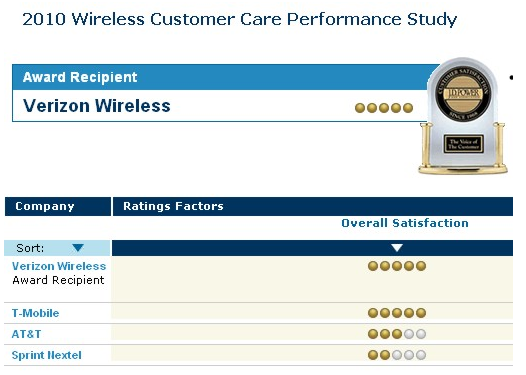
Verizon Wireless has won the 2010 J.D. Power and Associates 2010 Wireless Customer Care Performance Study, edging out T-Mobile for the first place slot.
According to the J.D. Power press release, Verizon Wireless performs best when contacts are resolved through phone calls to customer service and visits to the company's retail stores. In both situations, Verizon Wireless representatives "perform well with regard to identifying customer problems quickly and resolving them efficiently."
Coming in (a close) second was T-Mobile with 752 points. AT&T ranked third with 733 points, and Sprint came in last with 721 points. The industry average was 739 points.
Some interesting data that J.D. Power found:
- The rate of customers that report having contacted their carrier's care units has decreased by 3 percent during the past six months, with AT&T and Verizon customers stating particularly low contact rates.
- During the past six months, the number of customer contacts pertaining to credit issues such as overdue balances and credit extensions has increased by 50 percent.
- Despite owning phones with more complicated feature sets, wireless customers with smartphones do not rate customer care performance much lower than those with traditional mobile phones (735 vs. 741, respectively). However, smartphone owners, compared to traditional phone owners, are significantly more likely to have contacted their carrier with an issue during the past six months (49% vs. 40%, respectively) and it is less likely the issue was resolved on the first contact via telephone (74% vs. 77%, respectively). Regarding retail store contacts, smartphone owners also require more than three additional minutes to resolve their issues than do owners of traditional phones.
- Sixteen percent of customer phone contacts result from proactive calls or text messages originated by the wireless carrier. This has proven to be an effective way of limiting some potential issues from escalating, as customers who contact their carrier after receiving these communications are more satisfied (751, on average) than customers who do not receive proactive contact from their carrier (738).
Good news for Verizon, and to an extent, T-Mobile. The full release can be found here.
I'd like to hear from you as a sort of "PhoneDog Customer Care Survey" - which carrier do you love (or hate), and why?
